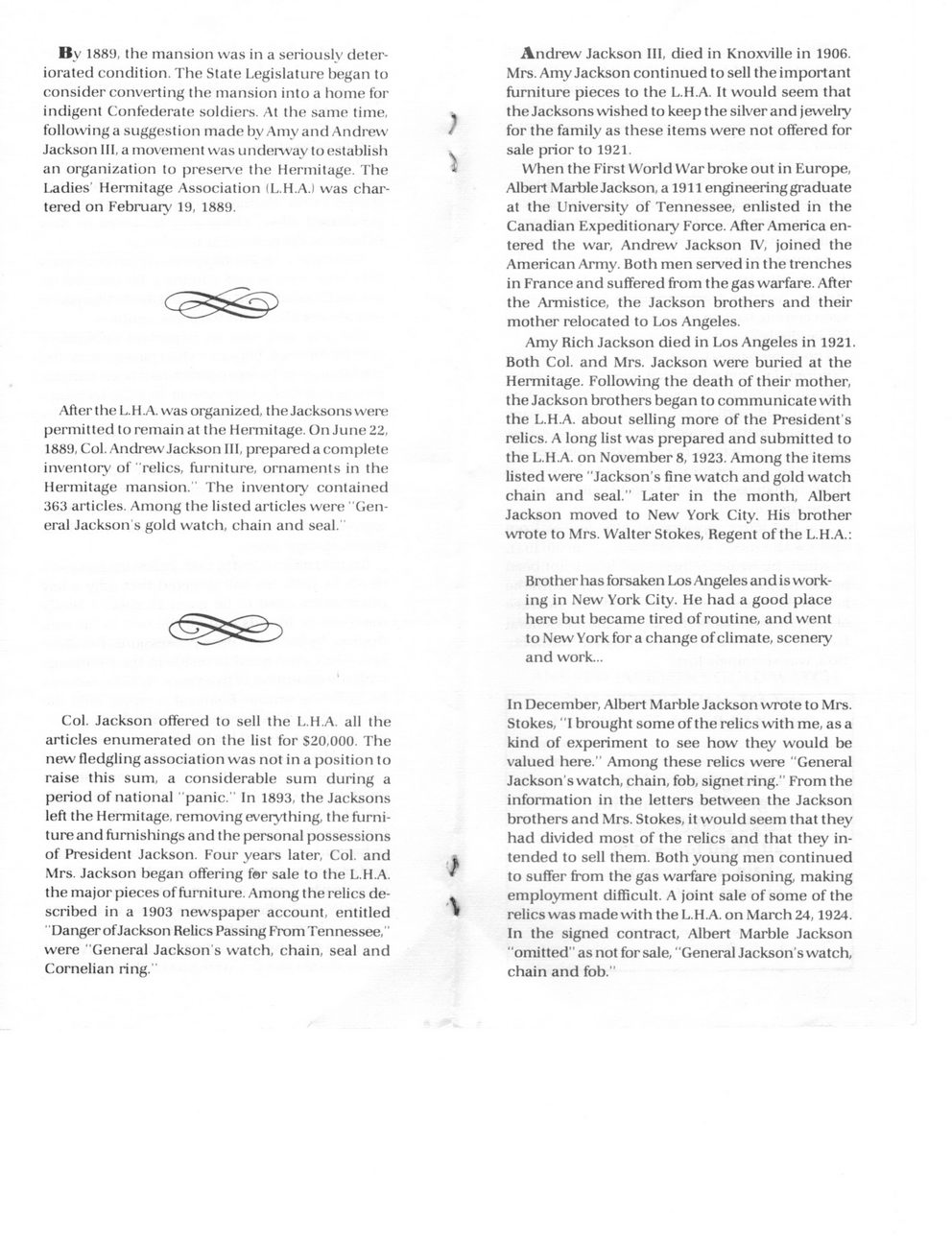This text was obtained via automated optical character recognition.
It has not been edited and may therefore contain several errors.
By 1889, the mansion was in a seriously deteriorated condition. The State Legislature began to consider converting the mansion into a home for indigent Confederate soldiers. At the same time, following a suggestion made by Amy and Andrew Jackson III, a movement was underway to establish an organization to preserve the Hermitage. The Ladies' Hermitage Association (L.H.A.) was chartered on February 19, 1889. After the L.H.A. was organized, the Jacksons were permitted to remain at the Hermitage. On June 22, 1889, Col. Andrew Jackson III, prepared a complete inventory of "relics, furniture, ornaments in the Hermitage mansion.1? The inventory contained 363 articles. Among the listed articles were "General Jackson's gold watch, chain and seal.' Andrew Jackson III, died in Knoxville in 1906. Mrs. Amy Jackson continued to sell the important furniture pieces to the L.H.A. It would seem that the Jacksons wished to keep the silver and jewelry for the family as these items were not offered for sale prior to 1921. When the First World War broke out in Europe, Albert Marble Jackson, a 1911 engineering graduate at the University of Tennessee, enlisted in the Canadian Expeditionary Force. After America entered the war, Andrew Jackson IV, joined the American Army. Both men served in the trenches in France and suffered from the gas warfare. After the Armistice, the Jackson brothers and their mother relocated to Los Angeles. Amy Rich Jackson died in Los Angeles in 1921. Both Col. and Mrs. Jackson were buried at the Hermitage. Following the death of their mother, the Jackson brothers began to communicate with the L.H.A. about selling more of the President?s relics. A long list was prepared and submitted to the L.H.A. on November 8,1923. Among the items listed were "Jackson?s fine watch and gold watch chain and seal." Later in the month, Albert Jackson moved to New York City. His brother wrote to Mrs. Walter Stokes, Regent of the L.H.A.: Brother has forsaken Los Angeles and is working in New York City. He had a good place here but became tired of routine, and went to New York for a change of climate, scenery and work... Col. Jackson offered to sell the L.H.A. all the articles enumerated on the list for $20,000. The new fledgling association was not in a position to raise this sum, a considerable sum during a period of national "panic." In 1893, the Jacksons left the Hermitage, removing everything, the furniture and furnishings and the personal possessions of President Jackson. Four years later, Col. and Mrs. Jackson began offering far sale to the L.H.A. the major pieces of furniture. Among the relics described in a 1903 newspaper account, entitled Danger of Jackson Relics Passing From T ennessee,'' were "General Jackson s watch, chain, seal and Cornelian ring. In December, Albert Marble Jackson wrote to Mrs. Stokes, "I brought some of the relics with me, as a kind of experiment to see how they would be valued here.? Among these relics were "General Jackson?s watch, chain, fob, signet ring.? From the information in the letters between the Jackson brothers and Mrs. Stokes, it would seem that they had divided most of the relics and that they intended to sell them. Both young men continued to suffer from the gas warfare poisoning, making employment difficult. A joint sale of some of the relics was made with the L.H.A. on March 24,1924. In the signed contract, Albert Marble Jackson "omitted" as not for sale, "General Jackson?s watch, chain and fob."

Jackson, Andrew 055